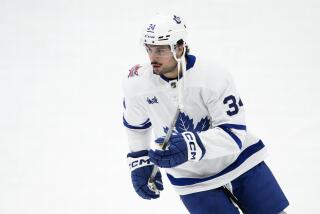Soviet Hockey Teams Making Rounds Again : Their North American Tour of NHL Cities Begins This Week
- Share via
The Soviets are back. In what promises to become an annual event, the top 2 finishers in the Soviet Elite Hockey League, Central Red Army and Dynamo Riga, this week begin a North American tour in which each will play 7 National Hockey League teams.
Central Red Army will open tonight in Quebec, and Dynamo Riga Tuesday in Calgary.
SportsChannel America, which will televise 11 of the 14 games, will present the Friendship Cup at the series’ conclusion to the entity, NHL or Soviet Union, that has compiled the best overall record.
Some of the NHL’s top teams--Calgary, Edmonton and the Kings--will face Dynamo Riga, a second-line squad that surprised everyone by reaching the playoff final in the spring but currently stands fifth in the Soviet Elite League and is a team without name players familiar to North American audiences.
However, the visits of perennial champion Central Red Army to Prince of Wales Conference cities could have memorable moments, with the key matches at New Jersey Jan. 2 and Pittsburgh Jan. 4.
New Jersey fans finally will get a look at defenseman Viacheslav Fetisov, the man they expected to be playing for them after the Soviets won the gold medal in the 1988 Olympic Games at Calgary.
Lou Lamoriello, the Devils’ general manager, made several trips to the Soviet Union and gained clearance from everyone except the Red Army for Fetisov to play in North America. Last week that permission became moot when Fetisov said he had decided not to make the move.
The game in Pittsburgh will send Mario Lemieux, this time without Wayne Gretzky, against virtually the same Soviet team that he starred against in the 1987 Canada Cup.
The preliminary Soviet roster listed the big five of Fetisov, Alexei Kasatonov, Vladimir Krutov, Sergei Makarov and Igor Larionov. There is some doubt about Larionov’s availability, after his recent complaints, printed in the magazine Ogonyok, about the oppressive training methods of Coach Viktor Tikhonov.
Larionov has been a maverick before and in 1984 disappeared briefly for a party with some of the Edmonton Oilers after the Soviets were knocked out of the 1984 Canada Cup. At last report, he had a severely sprained ankle, an excuse that might mask other reasons should he fail to join the tour.
These five were on the Soviet Elite League All-Star team last year, along with goalie Sergei Mylnikov of Traktor Chelyabinsk. But even without Mylnikov, who played every minute of the Calgary Olympics, the Army team has a capable goaltender in Evgeni Belosheykin, who played both games at Rendez-Vous ’87 and shared the duties with Mylnikov in the 1987 Canada Cup.
Each of the five has been drafted by NHL teams, with New Jersey selecting Kasatonov as well as Fetisov; Vancouver choosing Larionov and Krutov, and Calgary picking Makarov.
Despite statements at Calgary by Alan Eagleson, executive director of the NHL Players Assn., that Soviets would soon be playing in the NHL, that prospect appears to have been dimmed by Fetisov’s reluctance to become the trial horse.
Nevertheless, the exchanges between the NHL and the Soviets are expected to multiply. Eagleson and NHL President John Ziegler returned last week from Moscow, where they reviewed details of projects that will send two NHL clubs to the Soviet Union for exhibition games in September, 1989, and bring 4 Soviet teams here next winter for games involving all 21 NHL franchises.
Although the upcoming tour constitutes nothing more than exhibition games, it should generate considerable interest simply because of the contrasting styles. Where the NHL teams prefer to dump the puck and forecheck the defense, the Soviets feature a short passing game that involves all five players as a unit.
Many of the memorable hockey games involve teams from the Soviet Union.
One that stands out is the eighth game of the 1972 Summit Series in Moscow, when Paul Henderson’s goal with 34 seconds left gave Canada a come-from-behind 6-5 victory and the overall triumph in the NHL’s first confrontation with the Soviets.
Then there was the semifinal of the 1984 Canada Cup in Calgary, when Mike Bossy’s overtime goal lifted Canada, which benefited from the brilliant goaltending of Pete Peeters, to a 3-2 triumph over the Soviets.
Move along to the 1987 Canada Cup, when all three games of the final were decided by 6-5, Canada winning the last two on goals by Lemieux assisted by Gretzky. Game 2 required double overtime.
The victories by the U.S. Olympic team over the Soviets in 1960 and 1980 will go down as two of the great upsets in the history of the sport. From the Soviet point of view, so must the final of the 1954 World Championships when the Soviets, facing perennial champion Canada for the first time, posted a 7-2 victory.
Soviet teams have been playing in North America since the 1972 breakthrough and achieving remarkable success, considering the odds invariably are stacked against them. Playing in front of partisan fans, on rinks 15 feet narrower than those to which they are accustomed and in games usually officiated by NHL referees, the Soviets routed an NHL all-star team, 6-0, in the final of the 1979 Challenge Cup in New York, and defeated Canada, 8-1, in the final of the 1981 Canada Cup at Montreal.
The Central Red Army has had winning records against NHL teams in three previous exhibition tours, dating back to the 1975-76 visit that included the 3-3 New Year’s Eve tie at Montreal and the 4-1 intimidation loss at Philadelphia.
More to Read
Go beyond the scoreboard
Get the latest on L.A.'s teams in the daily Sports Report newsletter.
You may occasionally receive promotional content from the Los Angeles Times.








